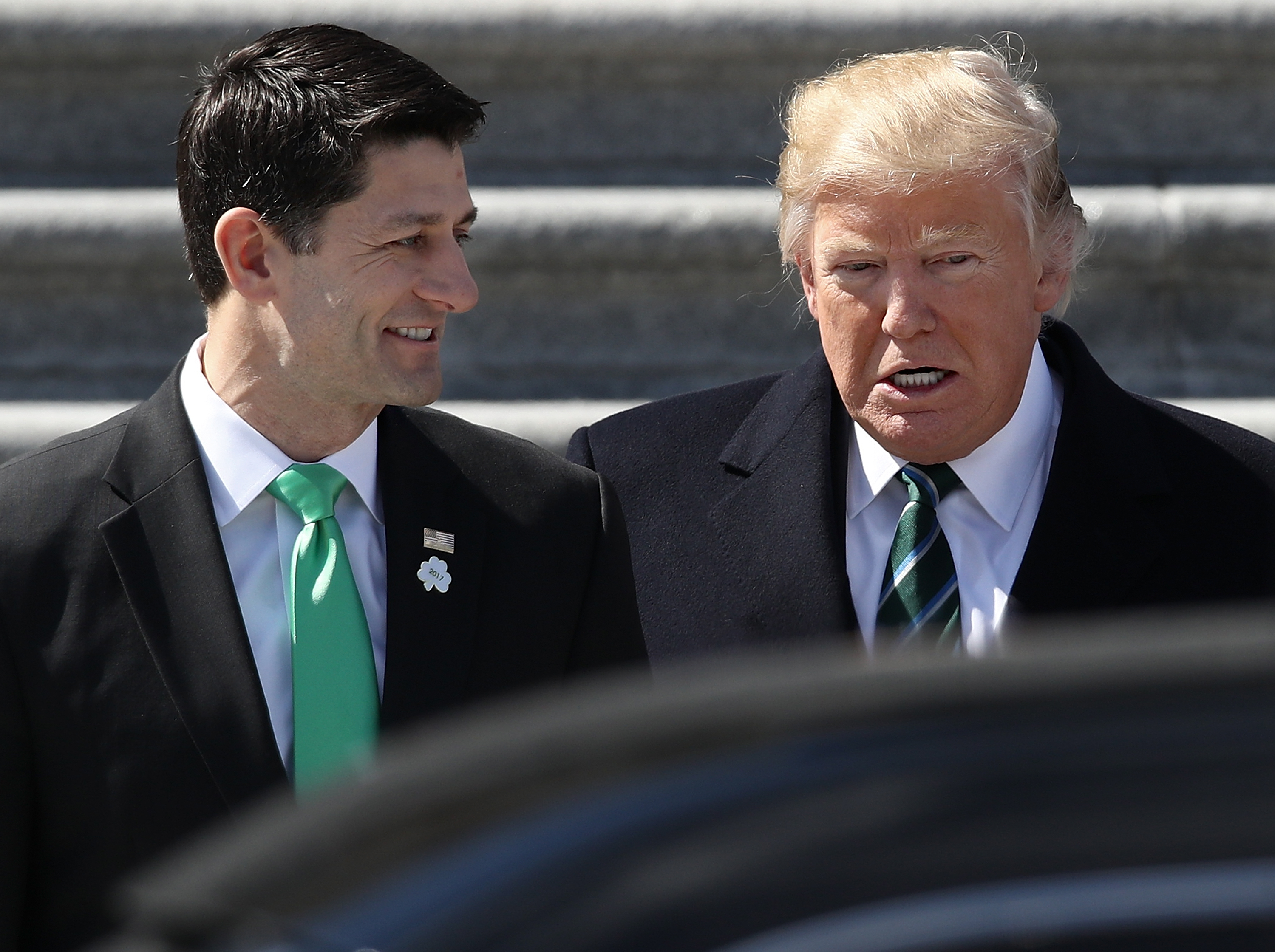There is no dealmaker on Earth crafty enough to save TrumpCare
The GOP is simply stuck — and no amount of negotiating can save it


A free daily email with the biggest news stories of the day – and the best features from TheWeek.com
You are now subscribed
Your newsletter sign-up was successful
Republicans' ObamaCare repeal is becoming more fraught by the day. Both President Trump and Speaker of the House Paul Ryan now concede that changes must be made to the American Health Care Act before it can have any hope of becoming law. But a retreat back to the drawing board won't be easy.
Trump thinks he can play "arbitrator" between GOP factions clashing over the substance of the bill. "It's very preliminary," he told Fox News' Tucker Carlson on Wednesday. "A lot of things aren't consistent [with his campaign]. But these are going to be negotiated."
To which I would respond: How? Any change to the bill to appease one Republican faction will inevitably alienate the other. Trump and the GOP are caught in a real bind of their own making.
The Week
Escape your echo chamber. Get the facts behind the news, plus analysis from multiple perspectives.

Sign up for The Week's Free Newsletters
From our morning news briefing to a weekly Good News Newsletter, get the best of The Week delivered directly to your inbox.
From our morning news briefing to a weekly Good News Newsletter, get the best of The Week delivered directly to your inbox.
The AHCA had been on the ropes from the moment Ryan unveiled it. Then came the disastrous Congressional Budget Office score this week. The nonpartisan agency forecasts that the bill would cause 24 million people to lose their insurance by 2026 and out-of-pocket costs to soar. This dismal forecast has almost certainly kneecapped the AHCA's chances of passing as it is.
But any attempt to rehabilitate the bill will only further strain the Republican Party. Improving the CBO score, and providing better coverage for more people, will require spending more — which will lose conservative votes. But taking steps to win over conservatives by cutting back subsidies and government coverage will make the CBO score worse — scaring off moderates.
For instance, one of the key sticking points for House conservatives has been the AHCA's delayed repeal of ObamaCare's Medicaid expansion. Trump hinted to conservatives that he would be willing to move the end date for the Medicaid expansion up to 2018 from 2020. But this would only worsen the CBO score by throwing more people off their insurance faster. And such a change would drive away Senate Republicans in states that count on the Medicaid expansion for coverage.
On the other hand, any change to mollify moderates in the Senate will antagonize hardline conservatives. A group of Senate Republicans told the White House that the bill must be revised to produce "lower insurance costs for poorer, older Americans and an increase in funding for states with high populations of hard-to-insure people."
A free daily email with the biggest news stories of the day – and the best features from TheWeek.com
This will require more government spending and more redistribution in order to, in the words of Sen. Jon Thune (R-S.D.), make the bill "more helpful to people on the lower end." It would effectively make the replacement even more like ObamaCare.
It would also improve the bill's coverage numbers from the CBO. But it would be a nonstarter for arch-conservatives like Sen. Ted Cruz (R-Texas) and the House Freedom Caucus. Those who objected to the AHCA as so-called "ObamaCare Lite" — the "the largest welfare program ever proposed by the Republican Party," in the words of Rep. Mo Brooks (R-Ala.) — will wage an all-out mutiny against any "ObamaCare Barely-Lite" that comes out of the Senate.
This tension is the product of longstanding contradictions in the Republican Party's thinking and rhetoric about health care. Conservatives are sticking to their ideological opposition to government intervention to guarantee health insurance for people. But for years, most of the Republican Party has campaigned on a much narrower practical opposition to certain outcomes under ObamaCare — specifically, its impact on premiums and out-of-pocket costs for consumers.
The problem is that these practical problems simply cannot be solved through conservative policymaking. Providing better quality, broadly available insurance coverage — as Republicans from Trump on down repeatedly promised to do — requires more government spending and intervention, not less.
The GOP has boxed itself in politically, too. After seven years railing against ObamaCare, anything less than a total repeal and replacement of the law will look like a devastating defeat under unified Republican government.
That didn't have to be the case.
After Barack Obama's re-election in 2012, then-Speaker John Boehner urged Republicans to give up the ObamaCare wars, declaring it the settled "law of the land." Had Boehner's party followed his lead, it would not be in the position of having to go big or slink home today. Relatively small conservative tweaks to the law would have been hailed as a win.
In fact, ObamaCare adopted a fundamentally conservative method of providing near-universal care: privately run insurance coupled with regulations, mandates, and government subsidies. Had Republicans managed expectations over the past seven years, they could have worked within this framework to implement a few conservative ideas, such as allowing insurance sales across state lines or permitting insurers to charge older people significantly more than younger people.
Instead, the GOP persisted in trying to delegitimize the law as an avatar for the Obama administration. They made the arguments about premiums and deductibles that they knew would be popular, all the while knowing that their own solutions would be deeply unpopular.
Now, Republicans are navigating widening political fault lines between the factions within their party. Ryan is simply hoping to dump the AHCA hot potato into the Senate's lap so it can become Mitch McConnell's problem. If Ryan can muscle the bill through the House, The New York Times reports, he would "leave it to Senate Republicans to decide if they want to be the ones to refuse to honor the longstanding Republican promise to repeal the law."
The problem is that the GOP has made conflicting promises about how it would legislate around health care. The party is stuck between its conservative principles and the pragmatic assurances it made to the American public. And it has no one to blame but itself.
Joel Dodge writes about politics, law, and domestic policy for The Week and at his blog. He is a member of the Boston University School of Law's class of 2014.
-
 Corruption: The spy sheikh and the president
Corruption: The spy sheikh and the presidentFeature Trump is at the center of another scandal
-
 Putin’s shadow war
Putin’s shadow warFeature The Kremlin is waging a campaign of sabotage and subversion against Ukraine’s allies in the West
-
 Media: Why did Bezos gut ‘The Washington Post’?
Media: Why did Bezos gut ‘The Washington Post’?Feature Possibilities include to curry favor with Trump or to try to end financial losses
-
 The billionaires’ wealth tax: a catastrophe for California?
The billionaires’ wealth tax: a catastrophe for California?Talking Point Peter Thiel and Larry Page preparing to change state residency
-
 Bari Weiss’ ‘60 Minutes’ scandal is about more than one report
Bari Weiss’ ‘60 Minutes’ scandal is about more than one reportIN THE SPOTLIGHT By blocking an approved segment on a controversial prison holding US deportees in El Salvador, the editor-in-chief of CBS News has become the main story
-
 Has Zohran Mamdani shown the Democrats how to win again?
Has Zohran Mamdani shown the Democrats how to win again?Today’s Big Question New York City mayoral election touted as victory for left-wing populists but moderate centrist wins elsewhere present more complex path for Democratic Party
-
 Millions turn out for anti-Trump ‘No Kings’ rallies
Millions turn out for anti-Trump ‘No Kings’ ralliesSpeed Read An estimated 7 million people participated, 2 million more than at the first ‘No Kings’ protest in June
-
 Ghislaine Maxwell: angling for a Trump pardon
Ghislaine Maxwell: angling for a Trump pardonTalking Point Convicted sex trafficker's testimony could shed new light on president's links to Jeffrey Epstein
-
 The last words and final moments of 40 presidents
The last words and final moments of 40 presidentsThe Explainer Some are eloquent quotes worthy of the holders of the highest office in the nation, and others... aren't
-
 The JFK files: the truth at last?
The JFK files: the truth at last?In The Spotlight More than 64,000 previously classified documents relating the 1963 assassination of John F. Kennedy have been released by the Trump administration
-
 'Seriously, not literally': how should the world take Donald Trump?
'Seriously, not literally': how should the world take Donald Trump?Today's big question White House rhetoric and reality look likely to become increasingly blurred
